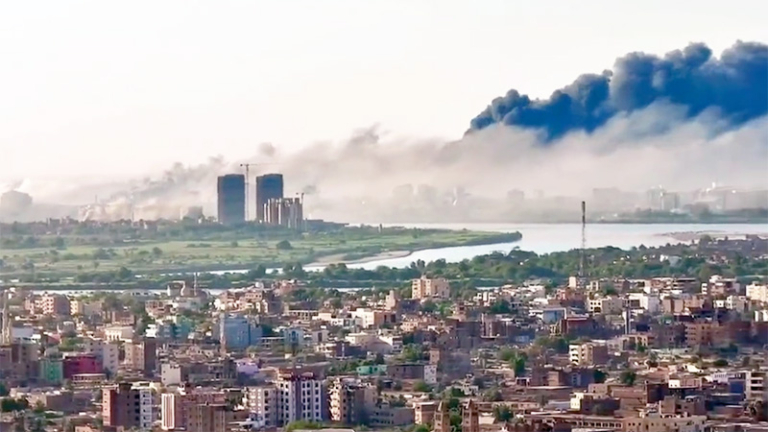
It would be very difficult to consider the ongoing intra-military conflict in Sudan as a struggle to advance the cause of democratic development in the country or to safeguard the interests of the Sudanese people. Indeed, what is occurring in the streets of Khartoum and other areas of Sudan is nothing more than a power struggle between two military officers who in 2019 pulled their support from their former benefactor, longtime dictator Omar al-Bashir, and only did so after a large pro-democracy uprising broke out and then persisted in pressing for its demands. To be sure, this clash between the Sudanese Army and the paramilitary Rapid Support Forces (RSF) was inevitable for two reasons: First, in general, powerful and ambitious military officers usually cannot share power, and second, Sudan’s military has never been ready and willing to relinquish its institutional and political privileges and to hand control over to a civilian government.
If anything, the clashes between the Sudanese Army, loyal to Chair of the Sovereign Council General Abdel-Fattah al-Burhan, and the Rapid Support Forces under the control of his deputy, General Mohamed Hamdan Dagalo (known as Hemedti), will undoubtedly kill any semblance of democratic politics in the country. Indeed, when the current fighting ends and one faction wins this raging battle, the transitional political process will very likely be declared dead and buried and the edifice of yet another authoritarian regime will be erected on the shoulders of the new military elites and their supporters.
At issue is a stalemated transitional process that began with Bashir’s ouster in Spring 2019 and the establishment of the Sovereign Council later that summer, which brought together military officers and civilian politicians. In October 2021, Burhan stopped the process by staging a coup against the government of then Prime Minister Abdalla Hamdok that was born alongside the council, and in the following November appointed a new Sovereign Council, which he continued to lead. He kept Dagalo on as his deputy to both maintain the apparent unity of the state’s military sector and to keep the leader of the militia that was responsible for much of the suffering and death in Darfur more than a decade ago close and under control. Following proposals from the international community for dialogue between military and civilian leaders, Burhan and Dagalo signed a political framework agreement on December 5, 2022, which was meant to gradually allow for a transition to civilian rule.
But an important proviso of this agreement was the initiation of security sector reform and the integration of the RSF into the Sudanese armed forces, a prospect that would obviously lead to Dagalo’s acceptance of a subordinate position within the military. While Burhan wishes that the integration would take place within two years, Dagalo—who has declared his acceptance of the unification of the armed forces—prefers to wait for ten years before this is accomplished. At any rate, it is likely that the current crisis has rendered this debate moot, since Burhan and Sudan’s de facto authorities have declared the RSF a “rebel militia” and its leader a “wanted criminal” with whom there will be no negotiations until his forces have been disbanded.
After two days of raging battles between the army and the RSF in Khartoum and around the country for control of the state’s strategic assets, the situation on the ground is still too fluid to declare a winner. Indeed, claims and counterclaims have been the dominant discourse since the start of the fighting on the morning of April 15, adding to the confusion of both local and outside observers. But as of this writing, 97 civilians have been killed and hundreds of others have been injured, according to the Sudan Doctors’ Syndicate, and no clear casualty figures have been announced for the combatants. Widespread condemnation of the fighting and calls to end it have come from both regional and international actors, but it is apparent that the two military leaders are in no mood for compromise or dialogue.
Whoever wins the fight and ensures their control of the state’s assets, and thus the country’s future, is unlikely to help shepherd the stalemated transitional process through. Burhan and Dagalo turned on Bashir in 2019 when they realized that he had lost legitimacy, the power to control the street, and the battle against demands for democracy and regime change. Today, each of these military leaders is in a battle for his own survival within an authoritarian regime that both helped build. But the winner will eventually contend with the same forces and dynamics of social and political change that toppled Bashir four years ago, and that will eventually usher in a democratic future for Sudan. But for now, the reality is that the much-vaunted transitional process that Burhan and Dagalo wanted to control after Bashir’s ouster has effectively been cut short, at least until Sudan’s civilian democratic opposition once again steps forth to make its voice heard in the streets.
The views expressed in this publication are the author’s own and do not necessarily reflect the position of Arab Center Washington DC, its staff, or its Board of Directors.
Featured image credit: Twitter

